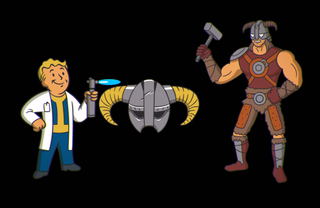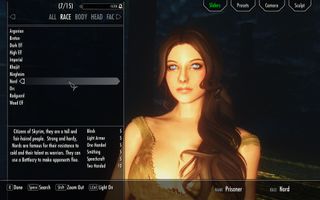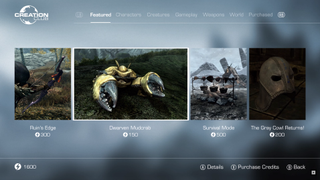Top Fallout 4 and Skyrim modders weigh in on Bethesda's Creation Club
How Bethesda's paid mods program differs from Steam's, and why three top modders like it.

The Creation Club was Bethesda’s most contentious E3 announcement. A follow-up to Valve’s failed paid mods program, the Creation Club will allow third-party developers, including modders, to create sanctioned add-on content for Fallout 4 and Skyrim: Special Edition. This content will be sold through in-game marketplaces for Creation Club Credits, which can be purchased via Steam.
The short version is that it’s paid mods. Bethesda insists that the Club isn’t paid mods, but it is. Crucially, it’s also a dramatically improved version of paid mods. Many questions remain unanswered, but we do know that Bethesda will screen applicants, curate Club content and optimize everything themselves to prevent conflict between mods. Club content must also be original, meaning existing mods won’t suddenly cost money. Perhaps most importantly, Bethesda says “there will still be plenty of free mods as well.”
"At first I was against it, but after talks with some other modding friends I changed my mind."
—Troy Irving, Fallout 4 modder
Assuming Bethesda follows through on these rules, the Club could actually be a positive development for modding. It’s not perfect; as our own Chris Livingston wrote, Club content would be better off free, with the store itself acting as a way to promote the best mods and compensate talented modders. In any case, it is a rare opportunity for modders to profit off their passion.
With all of that in mind, I spoke to three of the top Fallout 4 and Skyrim modders from the NexusMods community to gauge their thoughts on the Club. As it happens, everyone I spoke to has already applied to be a Club creator.

Improvements and inquiries
“At first I was against it, but after talks with some other modding friends I changed my mind and actually decided to put an application in,” says Troy Irving, creator of Fallout 4’s Settlement Supplies Expanded mod, which contains over 400 new objects and structures. “I saw it as another paid mods scenario, which was terrible the first time, but it’s a bit different this time around.”
For Irving, the Club’s improved quality control process, coupled with the fact that existing mods cannot be sold, was a big draw. It protects his mods and ensures the market won’t become saturated with overpriced garbage like $10 golden potatoes (yes, Skyrim had those). Many modders feel the same, including Doug ‘Gambit77’ Shafer, best known for his Armorsmith Extended mod for Fallout 4.
“It seems like they’re really taking all those problems from [Steam’s paid mods] and are trying to stamp them all out,” Shafer says. “With the curation process, I don’t see people stealing other people’s work and trying to sell it. Their policy of not allowing already released content will stop any possibility of thievery. People can’t steal other people’s identities and shit like that. It seems like they’ve thought it out quite a bit.”
PC Gamer Newsletter
Sign up to get the best content of the week, and great gaming deals, as picked by the editors.

Certainly, the Club is head and shoulders above the system Valve proposed in 2015. But there are still holes in Bethesda’s proposal, one of the biggest being how modders will be paid. Will they receive royalties based on sales of their content or a flat rate based on the scope of their project? Do creators get to decide? The modders I spoke to were divided on what payment model they’d prefer. One thing they did agree on was what kind of content they expect to see en masse on the Club store, namely custom armor sets and weapons.
“They don’t have much conflict with each other and they’re easy to put in,” says Brendan ‘Expired6978’ Borthwick, creator of Skyrim’s RaceMenu mod, which greatly enhances the game’s character creator. “I mean, I wouldn’t say they’re easy to make, but they’re easy to put in the game and install in your game.”
The advantages of a simple mod like a piece of gear are two-fold, Borthwick explains. Firstly, it’s just an item entry, so it doesn’t inherently conflict with other mods. Secondly, it would be easier to instantly generate in-game, which is one of the Club’s most-vaunted features—being able to buy a cool new sword and wield it within seconds.
That being said, Borthwick is more interested in expanding Skyrim’s core features, such as its follower system. Irving wants to make improved and custom weapon animations for Fallout 4, whereas Shafer is interested in building some from-scratch armor sets.
Above: Enderal is one of the most ambitious Skyrim mod projects to date, but it won't be sold on Creation Club.
The impact on free mods
Bethesda says the Club will include myriad content, from weapons and apparel to new locations and NPCs. But there’s been no mention of total conversion mods like Enderal: The Shards of Order, despite the fact that such massive mods are arguably most deserving of a price tag. So, why is the Creation Club ignoring the grandest mods in the business? Well, Borthwick believes total conversions are actually too big. .
“I don’t know about seeing that sort of stuff as DLC,” he says. “Those would be heavy engine mods, so they’d have to actually update the executable of the game to do anything with that ... I don’t think that’s really the target of the Creation Club mods, because that isn’t something you can easily put into your game.”
"We do this in our spare time. I don’t do it to make donations or money, I do it because I want to do it."
—Brendan Borthwick, Skyrim modder
Total conversion mods essentially build a new game out of an existing engine, so they wouldn’t mesh with existing Fallout 4 and Skyrim save files. To offer them via the Creation Club, Bethesda would have to sacrifice compatibility, which they’ve trumpeted from the get-go. Meaning total conversions will all but certainly remain free passion projects—as will plenty of other mods, according to everyone I spoke to.
“I don’t think it’s going to have a major impact [on free mods],” Borthwick says. “People are still going to be making mods on Nexus, and not everybody is going to try and push mods on the Creation Club … I don’t think it’s going to be something where people are just going to jump ship and start uploading tons of mods and go completely paid.”

Shafer agrees. “I don’t really buy into all the doom and gloom,” he says. “I know myself, and there’s plenty of projects that I would still be working on that would be free projects. In fact, most of my stuff would still be. I can’t speak for everybody, but if I was part of it, it wouldn’t stop me from working on the bigger picture stuff.”
The gist of the knee-jerk doomsaying which followed the Club’s announcement is that free mods will dry up as modders all sell their souls to Bethesda, but these experts are eager to continue producing free mods. The other common argument against the Club, and paid mods in general, is that involving money in any way somehow taints the spirit of modding. Shockingly, none of the modders I spoke with agree.
“We do this in our spare time. I don’t do it to make donations or money, I do it because I want to do it,” Borthwick says. “At the same time, I’m spending a lot of my time to do this and get almost literally nothing out of it … Most people would say ‘go find another job,’ but if you like doing this, what’s wrong with getting paid to do it?”
Shafer points out that if modders are being paid, they’re more likely to take on larger and more ambitious projects. Similarly, Irving expects the Club to attract new and talented creators to the modding scene—people who do stellar work but don’t have time to work for free. All of which could result in more and better mods.
Yes, Steam’s take on paid mods was a dumpster fire. Yes, Bethesda could have done a better job selling the Creation Club. (Dwarven mudcrab armor, which we lampooned in 2011, probably wasn’t the best headliner.) And yes, there are still lots of blanks that need to be filled. Even so, many modders are optimistic, not just because they may finally be paid for their time and effort, but because the Club may well benefit the modding community as a whole.

Austin freelanced for PC Gamer, Eurogamer, IGN, Sports Illustrated, and more while finishing his journalism degree, and has been a full-time writer at PC Gamer's sister publication GamesRadar+ since 2019. They've yet to realize that his position as a staff writer is just a cover-up for his career-spanning Destiny column, and he's kept the ruse going with a focus on news, the occasional feature, and as much Genshin Impact as he can get away with.
Most Popular

